Are you prepared for a potential Taxes Could High in 2026? The Tax Cuts and Jobs Act (TCJA) of 2017, which lowered individual tax rates, increased standard deductions, and expanded tax credits, is set to expire at the end of 2025. Unless Congress acts, tax rates will revert to pre-2017 levels, increasing the tax burden for millions of Americans.
Whether you are a middle-class earner or a high-income taxpayer, understanding these changes and planning ahead can help you minimize financial strain. Below, we summarise what is at stake and provide actionable strategies to protect your wealth.
Table of Contents
How the TCJA Expiration Could Affect You
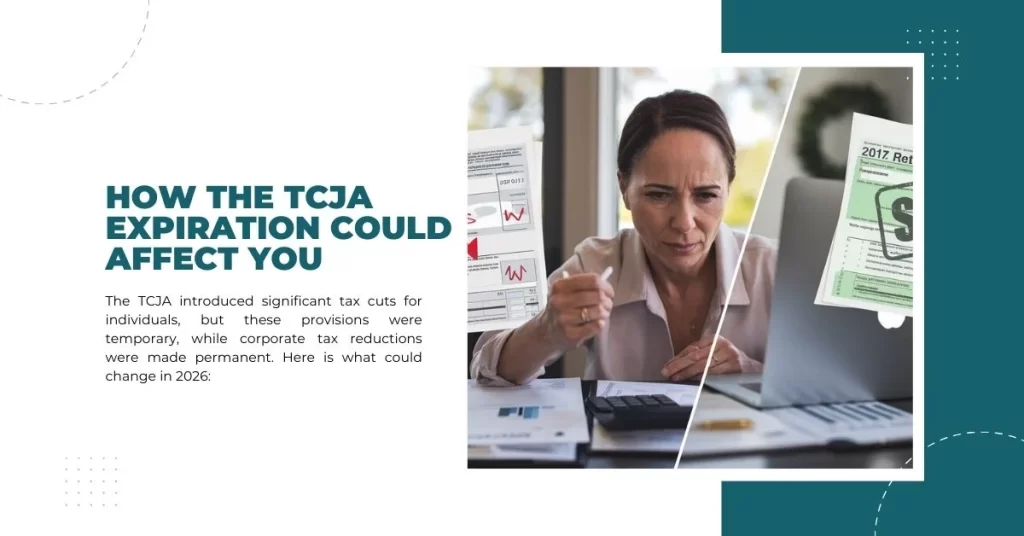
The TCJA introduced significant tax cuts for individuals, but these provisions were temporary, while corporate tax reductions were made permanent. Here is what could change in 2026:
Also read, Tax Reform Provisions that Affect Individuals – The Article provided by the IRS
- Higher tax brackets: Marginal rates could increase across the board, with the top rate jumping from 37% to 39.6%.
- Reduced standard deductions: The near-doubled standard deduction (12,950 single→ 12,950 single→ 6,500; 25,900 married→ 25,900 married→ 13,000 in 2017 terms) will shrink, increasing taxable income.
- Return of personal exemptions: Before TCJA, taxpayers could claim exemptions for dependents, which may return, complicating filings.
- Lower estate tax exemptions: The current $13.61 million exemption (2024) per individual could drop by nearly half, affecting wealth transfers.
Who Will Be Impacted Most?
- Middle-class households: The Tax Policy Center found that middle-income earners saved about $800 per year under TCJA. A full expiration could erase those savings.
- High earners: The top 1% benefited the most, with average cuts of $33,000 annually. If rates revert, they’ll face the steepest increases.
- Retirees & near-retirees: Those relying on tax-deferred accounts (401(k)s, IRAS) may face higher RMD (Required Minimum Distribution) taxes.
Also read full details of Trump’s TCJA Tax Plan: What You Need to Know About Proposed Changes
7 Key Strategies to Prepare Now
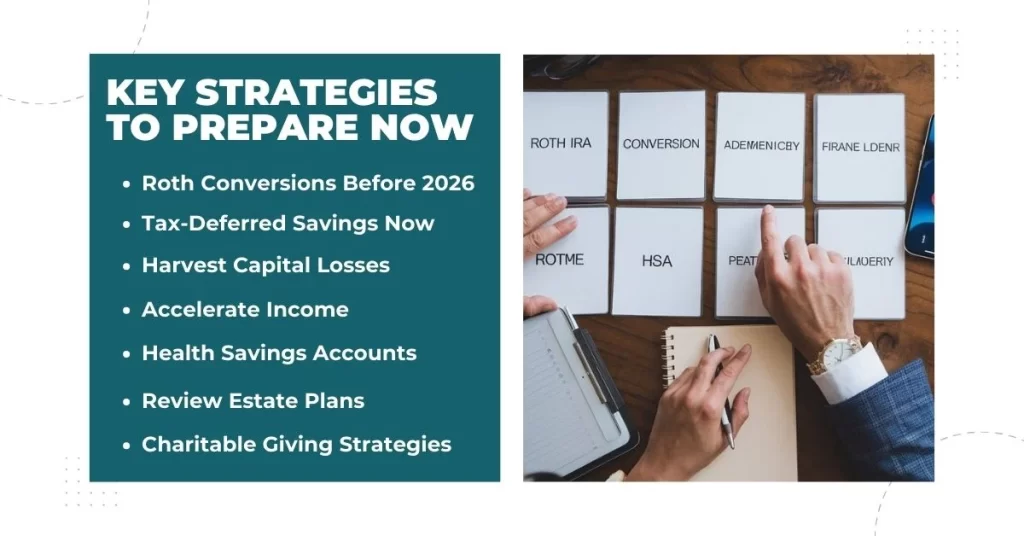
1. Consider Roth Conversions Before 2026
Roth IRAS allow tax-free growth and withdrawals. Converting traditional IRA or 401(k) funds to a Roth, while enjoying low tax rates, could save thousands in future taxes.
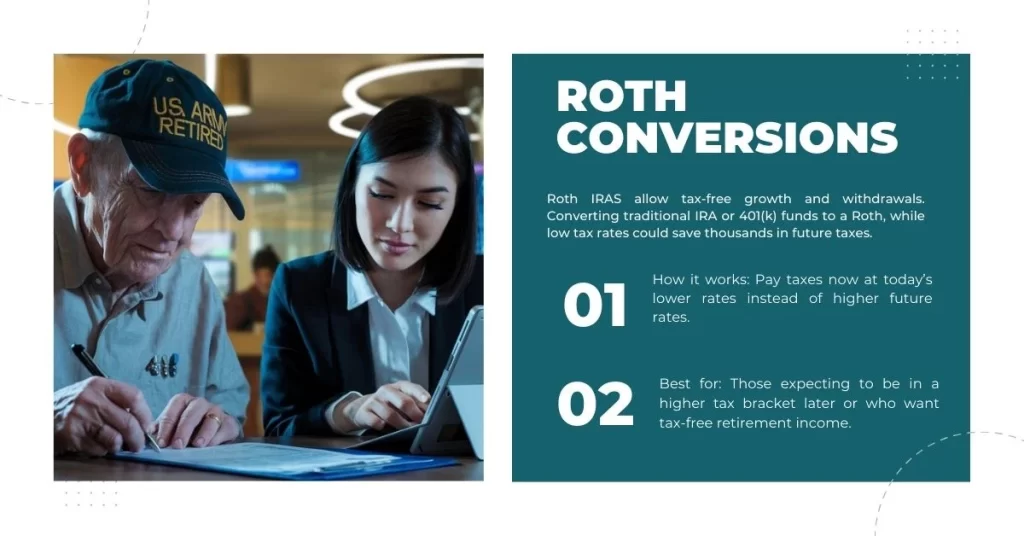
- How it works: Pay taxes now at today’s lower rates instead of higher future rates.
- Best for: Those expecting to be in a higher tax bracket later or who want tax-free retirement income.
Know more before starting: What You Need to Know Before Taking an IRA RMD From IRA 2025
2. Maximize Tax-Deferred Savings Now
If you expect lower income in retirement, contributing more to traditional 401(k)s and IRAS now locks in deductions at today’s rates.
- Action step: Increase 401(k) contributions, especially if employer matching is available.
3. Accelerate Income into 2024-2025
If you expect to be in a lower tax bracket now than in 2026, consider:
- Taking bonuses or business income early
- Exercising stock options
- Realizing capital gains at current lower rates
4. Harvest Capital Losses to Offset Future Gains
If you have investments at a loss, selling them before 2026 can help offset future capital gains taxed at higher rates.
Know more about Investment Loss – Beat the Tax: How to Use Tax Loss Harvesting for Maximum Savings
5. Review Estate Plans Before Exemption Drops
The estate tax exemption will fall to ~$7 million per person after 2025. High-net-worth families should consider:
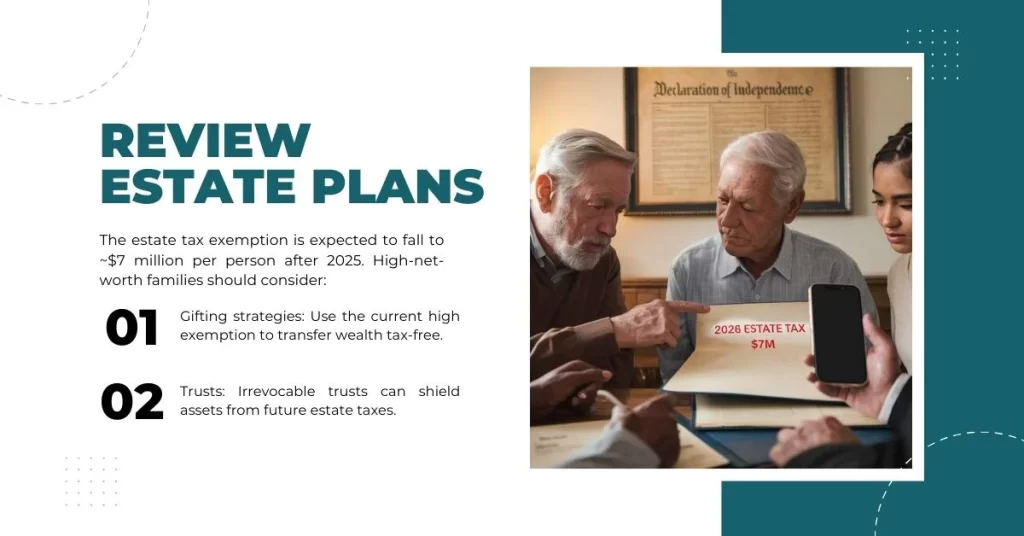
- Gifting strategies: Use the current high exemption to transfer wealth tax-free.
- Trusts: Irrevocable trusts can shield assets from future estate taxes.
6. Utilize Health Savings Accounts (HSAs)
HSAS offer triple tax benefits:
- Tax-deductible contributions
- Tax-free growth
- Tax-free withdrawals for medical expenses
Maximize contributions now to build a tax-free healthcare fund for retirement.
7. Reevaluate Charitable Giving Strategies
- Donor-Advised Funds (DAFS): Contribute now for an immediate tax deduction, then distribute funds later.
- Qualified Charitable Distributions (QCDS): If over 70½, donate IRA funds directly to charity to avoid taxable income.
The Post Written for Middle-Class Earner, must read: How Middle-Income Earners Can Save More?, New IRS Rules (Filed in 2026)
“If you make a major mistake [about taxes], you could throw off your retirement calculations by a significant factor.” – Can I Retire Yet?
5 Most Asked FAQS About the TCJA Expiration
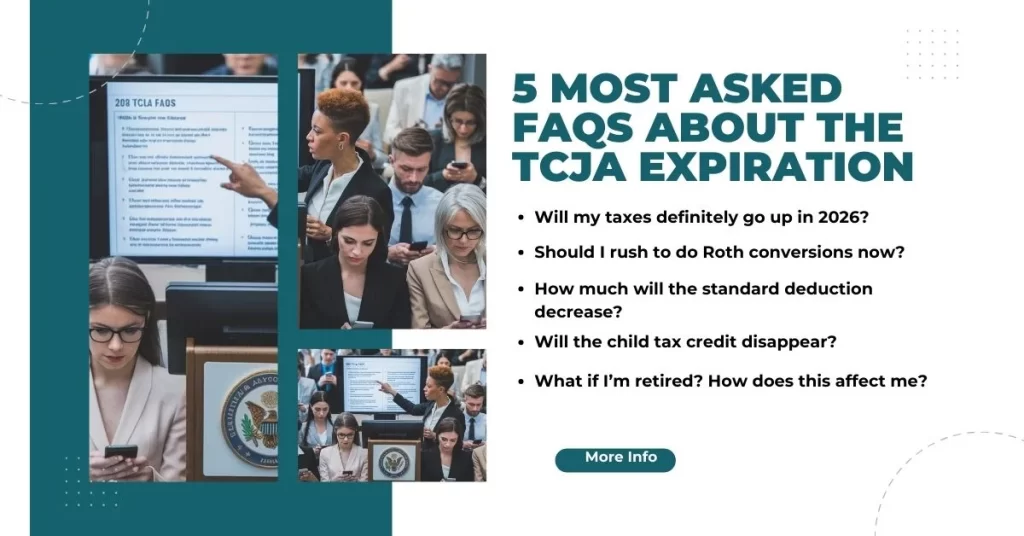
1. Will my taxes definitely go up in 2026?
Not necessarily. Congress could extend some or all provisions. However, given political uncertainty, planning for higher taxes is the safest approach.
2. Should I rush to do Roth conversions now?
It depends on your tax bracket now vs. future expectations. A financial advisor can run projections to determine the optimal amount to convert.
3. How much will the standard deduction decrease?
It’s expected to roughly halve (e.g., 25,900 for married couples→ 25,900 for married couples→ 13,000, adjusted for inflation).
4. Will the child tax credit disappear?
The current 2,000 credit could revert to 2,000 credit could revert to 1,000 per child, and phase-out thresholds may tighten.
5. What if I’m retired? How does this affect me?
- Higher RMD taxes: Withdrawals from 401(k)s/IRAs could be taxed at higher rates.
- Social Security taxes: More benefits may become taxable if income thresholds revert.
Final Advice: Stay Flexible & Seek Expert Guidance
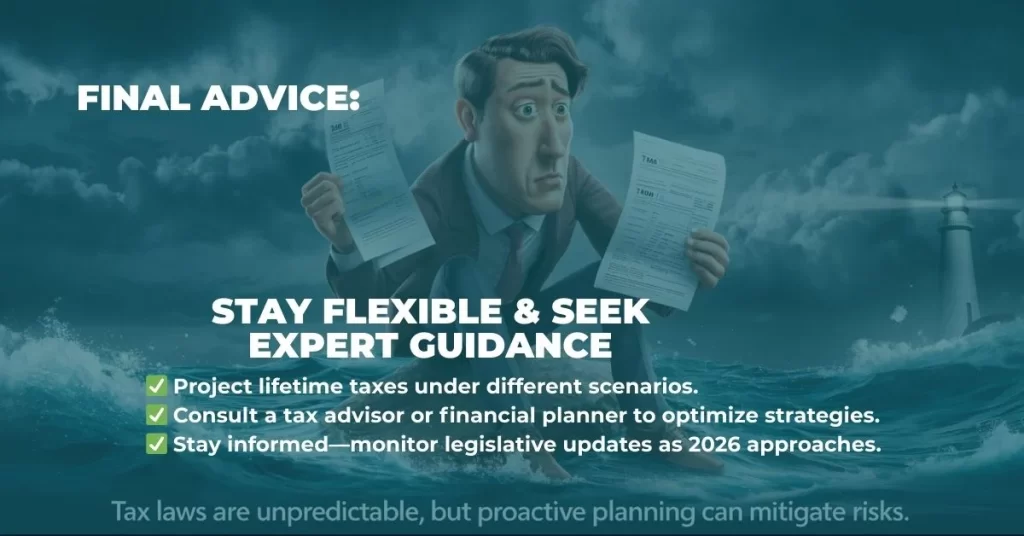
Tax laws are unpredictable, but proactive planning can mitigate risks.
✅ Project lifetime taxes under different scenarios.
✅ Consult a tax advisor or financial planner to optimize strategies.
✅ Stay informed—monitor legislative updates as 2026 approaches.
Bottom Line on Taxes Could High in 2026
The 2026 tax cliff could significantly impact your finances. By acting now—whether through Roth conversions, accelerated income, or estate planning—you can reduce future liabilities and secure your financial future.
Need personalized advice? A certified tax professional can help tailor a plan based on income, retirement goals, and risk tolerance.
Disclaimer: This article is for informational purposes only and does not constitute tax or financial advice. Consult a qualified professional for personalized guidance.
Would you like a customized tax plan before 2026? [Contact Us/Book a Consultation] to discuss your options.
Hi there! I am Sudip Sengupta, the face behind “Tfin Career”. Tfin Career is a sole proprietorship finance and consulting firm that makes complex tax and financial concepts easy to understand for everyone. With more than 21 years of experience in the field, I have noticed that people cannot make the right decisions in this field. So, I decided to create “Tfin Career” to help individuals and businesses alike. Here I urge those who are confused to make better choices. Also, it is good news for my dear clients and every visitor that I/we are going to start a training module for those who want to choose a career path in Finance and Taxation. Just follow my website.
Thank you for reading this post, don't forget to subscribe!






